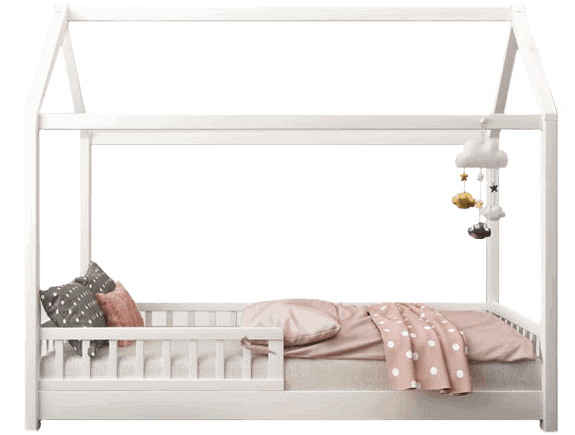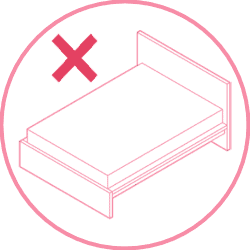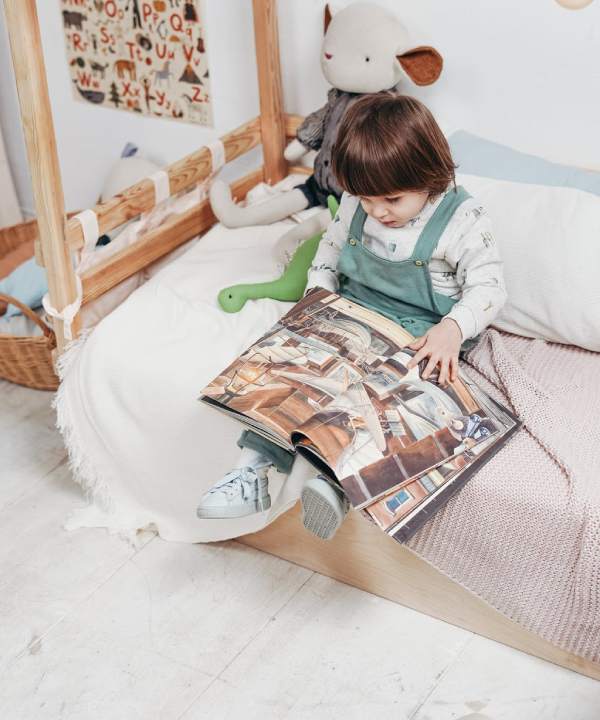They say it’s never too early to start learning. This is clearly no exception when it comes to the Montessori approach to your child’s bedroom. Pushing cognitive boundaries and encouraging learning at every step of the way is the heart of this approach. “That sounds great!” you say.
“But, what’s a Montessori floor bed?”.

Dr. Maria Montessori created the Montessori method as a child-centered way of learning that revolves around child-led activities at home and in the classroom. When this approach is applied in the nursery, pictures at eye-level, and tiny furniture are the way to go. This approach has also given rise to the Montessori floor bed. Theoretically, this sleep setup helps advance the child’s motor skills and fosters independence through self-paced learning.
Topics Explored
- What are Montessori floor beds? »
- Why are Montessori beds on the floor »
- Pros and cons of a Montessori floor bed »
- What is the appropriate age for Montessori beds »
- Safety tips for floor beds »
Floor Bed 101
Simply put, the Montessori concept relies on having everything a child needs at their level. They can climb in and out of bed; they can go through their toys and books and explore their surroundings on their own. This is what makes the Montessori floor bed so great!
The Pros and Cons of a Montessori Floor Bed
Before deciding if a Montessori floor bed is right for your toddler, here’s a list of what we consider the ‘advantages’ and ‘disadvantages’ of such a setup. Remember, every child and parent is different so some of these may not apply to you.
Montessori Floor Bed Benefits:

Empowers Your Child
Every parent strives to raise their child to become a strong independent individual. A floor bed will empower your child and stimulate decision making because everything they want is within their reach. Your child has the freedom to decide what they want to do each time they wake up.
This easily accessible bed initiates a chain of decision-making processes; they’re free to browse their shelves, pick up clothes, toys, or books. Your child chooses when to take a break and go back to bed.
Promotes Independence
Parenthood is a real privilege, but it’s tough to wake up each morning to your child’s cries to be let out of the crib. A floor bed will contribute to morning calmness because your child doesn’t need your assistance to leave their bed.
The child is independent to create their morning routine at their own pace. They can leave the bed on their own without asking you for permission or help. This reduces stress tremendously for both the child and the parent.
Saves Cost
Cribs are expensive; even if you buy them used, you must purchase a mattress to fit in the crib, and you can use it only until your child turns three.
Montessori beds come at a flexible cost – splurge on an extensive, high-quality mattress, and your child can use it for a decade. If you’re switching from a crib, take out that mattress. A floor bed will cost you less than half the money you’d spend on a crib and a toddler bed.
More Time Off for Parents
Children are full-time work, and parents deserve time off. With a Montessori bed, you’re no longer required to be your child’s non-stop entertainer. Children have everything they need at their level, making it easy to keep themselves occupied.
Forget sleepless nights or waking up at dusk; with a floor bed, your child can wake up and play for hours before looking for you. Children who sleep on a floor bed don’t wake you up at night crying; they learn to soothe themselves and go back to sleep. Parents get much required uninterrupted alone time.
Montessori Floor Bed Cons:

Baby or Toddler-Proofing Required
There’s not much to stress about when your child’s playing in their crib. But a free-roaming baby is unpredictable so you need to think about each possible scenario and baby-proof everything.
A child’s safety can’t be compromised so baby-proofing is the first step you must take before placing a floor bed. It can be troublesome considering you need to get on the floor and profoundly examine what could possibly hurt your child.
More Exposed to Allergens
Carpets and floors are the hardest to keep clean all the time, and having in mind the floor bed’s proximity to them; this creates a problem. Dust particles and allergy triggers can find their way onto the child’s floor bed and cause a reaction. Keep in mind that the child walks and rolls around their room and onto the bed all day.
While cribs are raised, Montessori beds lie directly on the floor and have zero air circulation. This creates an ideal environment for mold development, exposing your child to risk.
Perception of Safety
Various safety concerns arise when you consider switching to a Montessori bed. A crib has bed rails that assure you your child won’t fall or escape, while the floor bed is easy to wiggle out of, even for a baby.
Make the floor bed as safe as you can; if you baby-proof the room and remove hazardous objects, there are limited reasons for concern. Don’t forget that toddlers can easily reach a doorknob, so you’ll have to install a baby fence to keep them from leaving the room in the middle of the night.
What Age is it Appropriate for Montessori Beds?
Transitioning to a Montessori bed depends on you and your child’s readiness. The general rule is that the floor bed is suitable for babies two months and up, but you can transition whenever you want or feel ready.
Some parents start with a woven baby basket or bassinet and transition to a floor bed by the third month. But you can transition successfully from a crib or co-sleeping to a floor bed even at a later age.

Safety Tips for Floor Beds
Baby-proofing
First of all, make sure all furniture is stable, and your child can’t climb on them and fall. It would be best to cover all sockets and ensure they have no access to cords and cables. Remove choking hazards and potentially messy things like pens and cosmetics, cover all sharp edges and corners, and place a soft rug next to the bed.
Floor Pads
Children often roll out of bed in their sleep, and with a floor bed, there are no rails to keep them from falling. Ensure a soft landing when your child rolls out of bed and prevent them from bumping their head on the hard floor. Place a play mat, soft carpet, or another floor padding, so even babies can safely leave their beds.
Firm Mattress
Don’t let the fear of a sudden infant death syndrome keep you from switching your child to a Montessori bed. The odds of a baby suffocating on a floor bed are close to none if you prepare correctly. All you need to do is pick a firm mattress and keep it bare, and always remove all stuffed toys and pillows from the bed before leaving your baby alone.
Switching Back
Trying and failing is better than not trying at all! Your child might not accept the floor bed as you imagined. Workout what’s in the best interest of your child, and don’t get frustrated. No judgment if you can’t get adjusted to a Montessori bed. Put your crib back up and pat yourself on the back for trying.